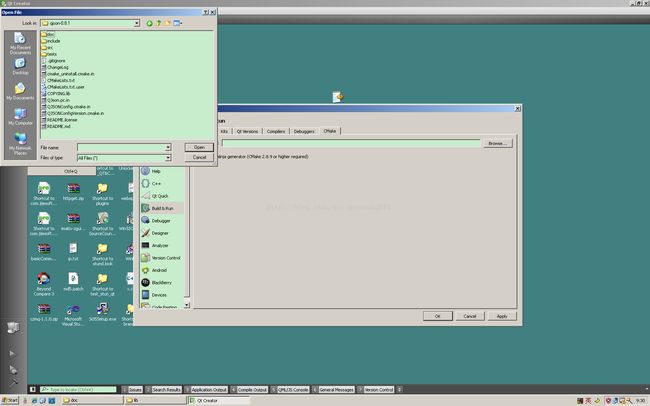- 程序代码篇---Pyqt的密码界面
Ronin-Lotus
程序代码篇上位机知识篇pyqt数据库pythonubuntu
文章目录前言一、代码二、代码解释2.1用户数据库定义2.2窗口初始化2.3认证逻辑2.5角色处理2.6错误处理优化2.7功能扩展说明2.7.1用户类型区分管理员普通用户其他用户2.7.2安全增强建议三、运行效果四、运行命令五、界面改进建议5.1密码显示5.2用户头像显示5.3输入框动画效果5.4加载进度显示5.5键盘快捷键前言本文简单介绍了在Ubuntu系统上使用Python的Pyqt创建密码登录
- python Qt
Solkatt's
最近帮朋友做了一个将文本文件按条件导出到excel里面的小程序。使用了PyQT,发现Python真是一门强大的脚本语言,开发效率极高。首先需要引用fromPyQt4importQtGui,uic,QtCore很多控件像QPushButton是从QtGui的空间中得来的,下面def__init__(self,parent=None)中定义了界面的设计及与控件相互联系的方法。classAddressB
- PyQt和PySide的区别和比较
PgosOcaml
pyqtmfcc++
PyQt和PySide的区别和比较PyQt和PySide是两个用于创建图形用户界面(GUI)的Python库。它们都是基于Qt框架,Qt是一个跨平台的应用程序和UI开发框架。本文将介绍PyQt和PySide之间的区别和比较,并提供相应的源代码示例。开发者许可证:PyQt的开发者许可证是商业许可证,因此如果您想在商业项目中业项目中使用PyQt,您需要购买相应的许可证。而Py业项目中使用PyQt,您需
- 【Python Qt 基本概念】深入探讨 PySide6 与 PyQt6:选择、共存与最佳实践
泡沫o0
Qt应用开发-探索Qt的魅力与实践Python基础教程mfcc++qt开发语言python嵌入式linux
目录标题第一章:Python绑定的Qt库——PySide6与PyQt6的比较1.1PySide6与PyQt6的基本介绍1.1.1PySide6:Qt官方推荐的Python绑定1.1.2PyQt6:成熟的第三方Python绑定1.1.3主要差异:许可证1.2两者的相似性与差异性1.2.1功能和性能差异1.2.2API差异与兼容性1.3总结:选择的自由与责任第二章:在VSCode中使用PySide6与
- 浅谈VB.NET为何还没有被时代淘汰
练习AI两年半
.net
最近在做一个旧项目的更新和维护,比较头疼的是这个项目是08年写的,当时编写编写语言为c++、环境为vc6.0+MFC(嘶~,这玩意儿年纪比我还大),需要将环境改为VS2022、.NET框架,为配合项目组其他同事,新语言改用VB.NET。我之前一直在用C++和QT写项目,一时间让我换一种语言和框架,还要在c++和vb.net之间反复横跳确实让我很崩溃。但打工人再难的项目也要硬着头皮上呀,好在VB.N
- AWS CLI with MinIO Server
库海无涯
aws云计算
1、InstallMinIOServerhttps://min.io/docs/minio/linux/index.htmlCreateAKandSKandrecordinformation.AK:ZYYMPcLi6dSPsDfr5QeWSK:Am3m2qtpkUk2wAgT5dPbpE4hGD2tX7a6RpjsbeEdAndcreateabucketnamedaswtest.2、Install
- LabVIEW实现LoRa通信
不脱发的程序猿
LabVIEW物联网开发实战labview
目录1、LoRa通信原理2、硬件环境部署3、程序架构4、前面板设计5、程序框图设计6、测试验证本专栏以LabVIEW为开发平台,讲解物联网通信组网原理与开发方法,覆盖RS232、TCP、MQTT、蓝牙、Wi-Fi、NB-IoT等协议。结合实际案例,展示如何利用LabVIEW和常用模块实现物联网系统的快速开发与原型设计,助你从基础到实战,全面掌握物联网开发技能。开源免费LabVIEW学习专栏分享:L
- 【QT入门】 Qt槽函数五种常用写法介绍
不吃~香菜
QT入门qt开发语言槽函数信号槽
声明:该专栏为本人学习Qt知识点时候的笔记汇总,希望能给初学的朋友们一点帮助(加油!)往期回顾:【QT入门】实现一个简单的图片查看软件-CSDN博客【QT入门】图片查看软件(优化)-CSDN博客【QT入门】lambda表达式(函数)详解-CSDN博客【QT入门】Qt槽函数五种常用写法介绍一、信号槽基本概念Qt的信号槽是一种用于处理事件和通信的机制,是Qt框架中的一个重要特性。信号槽机制使得对象之间
- 【QT入门】qmake和cmake的简单区别
不吃~香菜
QT入门qt开发语言学习qmakecmake
声明:该专栏为本人学习Qt知识点时候的笔记汇总,希望能给初学的朋友们一点帮助(加油!)往期回顾:【QT入门】Windows平台下QT的编译过程-CSDN博客【QT入门】VS2019+QT的开发环境配置-CSDN博客【QT入门】VS2019和QTCreator如何添加第三方模块-CSDN博客【QT入门】qmake和cmake的简单区别qmake和cmake是两种常用的构建工具,用于自动化构建C++项
- 编译QT5.15.2 qtwebengine模块以支持mp4
m0_74822999
qt开发语言
由于版权限制,Qt官方无法在其二进制包中提供某些解码器,这导致QtWebEngine无法支持一些常见的视频格式(如MP4)。为了解决这一问题,我们可以通过重新编译QtWebEngine来集成所需的解码器一、编译准备1.获取源码qtwebengine-everywhere-src-5.15.2.zip2.编译环境Python2.7.5:Python2.7.5Perl:StrawberryPerlfo
- 探索未来桌面应用的极限:QtWebEngine深度剖析与推荐
张姿桃Erwin
探索未来桌面应用的极限:QtWebEngine深度剖析与推荐去发现同类优质开源项目:https://gitcode.com/在追求极致用户体验和无缝互联网集成的时代,QtWebEngine犹如一座桥梁,将Chromium的强大力量与Qt框架的灵活性完美融合,为开发者打开了无限可能的大门。本文将深入解析这一开源宝藏,探讨其技术内核,应用场景,并揭示它的独特魅力。项目介绍QtWebEngine——是一
- 龙芯架构适配:Qt 5.15.2 QWebEngine源码包推荐
曹勇宁
龙芯架构适配:Qt5.15.2QWebEngine源码包推荐【下载地址】Qt5.15.2QWebEngine适配龙芯LoongArch架构源码包本仓库提供了一个针对龙芯(LoongArch)架构的Qt5.15.2QWebEngine源码包,适用于UOS系统。由于标准的QWebEngine源码不支持LoongArch架构,因此需要进行适配才能在该架构的UOS系统上进行编译项目地址:https://g
- Pyhton安装PyQT6
三口一个桃
pythonpyqt
Windows系统使用CMD命令安装,对于系统中有多个版本python的,在安装pyqt6/pyqt5时需要针对每个python版本单独安装。安装准备过程:①Win+R打开CMD命令行窗口②输入命令:python--version查看当前python版本是否是自己需要安装pyqt6/5的的版本,若是则执行第③步,若不是则执行下述操作:打开电脑环境变量设置(自行百度)--点击系统变量中的Path项-
- PyQt6/PySide6 的 QSettings 类(配置管理)
燃灯工作室
Pysidepython开发语言
一、QSettings核心机制存储原理:基于键值对的持久化存储Windows:注册表路径HKEY_CURRENT_USER\Software\[组织名]\[应用名]macOS:~/Library/Preferences/[组织名].[应用名].plistLinux:~/.config/[组织名]/[应用名].conf基础代码框架:fromPySide6.QtCoreimportQSettings#
- Qt C++ 多线程串口通讯同步机制示例
ice_junjun
qtc++开发语言
当在QtC++中使用多线程进行串口通讯时,由于串口的阻塞读取特性,必要的线程同步和数据保护也是非常重要的。以下给出一个实现多个线程共享一个串口实例的示例程序,并使用QMutex作为线程同步机制来确保资源的安全访问:创建一个名为SerialPortManager的单例类,该类封装了串口的打开、关闭、读写等操作并提供给其他线程调用:classSerialPortManager:publicQObjec
- python --桌面开发pyqt安装(mac 环境)
Xiao_Qiang_
python
纪录下,在安装pyqt的时候花了些时间,现在纪录下参考http://www.noktec.be/python/how-to-install-pyqt4-on-osx步骤DownloadtheSIPpackage(snapshotforOSx)DownloadthePyQtpackage(snapshotforOSx)DownloadQtInstallQtInstallSIPInstallPyQta
- 基于QScriptEngine的简单解释器
有追求的菜鸟
qt解释器模式
需求:voidDataFormatPipline::DataFormatPipline(QMapdata,QStringListtarger){}data中保存元素数据,类似Fe-1.2,Cu-2.4,Mn3.5,QStringList中的为Fe/Cu,Fe/Cu-Mn,Fe*Cu+Mn,如何利用解释器或者其它简单的方法完成这个需求?解决方案:现在项目中添加scriptQT+=corescript
- Qt上位机编程命名规范-执行版
有追求的菜鸟
qt开发语言
主要规范原则参考Qt上位机编程命名规范。1.文件/文件夹大小写分析考虑跨平台性,全小写是一种约定俗成的风格,在许多大型开源项目中(如Linux内核、Python标准库)被广泛使用。1.1.配合文件扩展名通常文件名小写配合小写扩展名(如.h,.cpp,.json),使整体风格统一:main.cppconfig.jsonutils.h1.2.文件夹和pri文件命名通常小写、下划线分开:control_
- pyqt5报错:qt.qpa.plugin: Could not find the Qt platform plugin “xcb“(已解决)
一问三不知_
计算机知识qt开发语言ubuntubugcondapython
我在使用pyqt库的时候报错:qt.qpa.plugin:CouldnotloadtheQtplatformplugin"xcb"in\"/mnt/private_disk/anaconda3/envs/aot-manip/lib/python3.8/site-packages/PyQt5/Qt5/plugins/platforms"eventhoughitwasfound.Thisapplica
- GStreamer —— 3.1、Qt+GStreamer制作多功能播放器,支持本地mp4文件、rtsp流、usb摄像头等(可跨平台,附源码)
信必诺
GStreamerQtGStreamerQt
运行效果 介绍 本项目基于Qt和GStreamer开发了一款多功能播放器,
- GStreamer —— 3.2、Qt+GStreamer+OpenCV制作图像处理播放器(对每帧图像处理),支持本地mp4文件、rtsp流、usb摄像头等(可跨平台,附源码)
信必诺
GStreamerQtGStreamerQt
运行效果 介绍 本项目是一个结合了Qt、GStreamer和OpenCV的跨平台图像处理播放器项目。该
- 在Ubuntu20.04上交叉编译能在Windows上运行的Qt5应用
daqinzl
linuxqtC++Ubuntu20.04Qt5交叉编译Windows应用
参考链接:https://blog.csdn.net/Interview_TC/article/details/146050419https://bugreports.qt.io/browse/QTBUG-82592重要设置sudoupdate-alternatives--configx86_64-w64-mingw32-g++选择后缀带posix的,(/usr/bin/x86_64-w64-mi
- 在QT中进行控件提升操作
琳琳简单点
qt开发语言控件提升
目录一、概述二、功能需求三、提升操作1)拖入标准控件2)自定义类3)提升控件一、概述QT中提供的标准控件能够满足我们大多数情况下的功能需求,但是在一些特殊应用场合,我们可能需要对控件的功能进行扩展,或者改写控件的功能实现。为满足此需求,QT提供了对标准控件的提升功能,用于重新自定义标准控件的实现。本文以QListWidget控件为例,详细介绍了控件提升的具体操作和实现。二、功能需求我们需要实现在Q
- 【Q&A】装饰模式在Qt中有哪些运用?
浅慕Antonio
Q&Aqt数据库服务器
在Qt框架中,装饰模式(DecoratorPattern)主要通过继承或组合的方式实现,常见于IO设备扩展和图形渲染增强场景。以下是Qt原生实现的装饰模式典型案例:一、QIODevice装饰体系(继承方式)场景为基础IO设备(如文件、缓冲区)添加数据格式解析、缓冲优化等功能。类图(Mermaid)«abstract»QIODevice+readData()+writeData()QFileQBuf
- ffmpeg录屏
_洛_神
音视频音视频
qt+ffmpeg屏幕录制软件完整工程链接:https://download.csdn.net/download/weixin_42538789/85013858测试代码#include#include"screencapture.h"#includeusingnamespacestd;intmain(intargc,char*argv[]){QCoreApplicationa(argc,argv
- yolov8实战第七天——pyqt5-yolov8实现车牌识别系统(参考论文(约7000字)+环境配置+完整部署代码+代码使用说明+训练好的模型)
学术菜鸟小晨
yolov8实战100天pythonYOLOpyqt5车牌识别毕业设计论文
基于pyqt5-yolov8实现车牌识别系统,包括图片车牌识别,视频车牌识别,视频流车牌识别。效果展示(图片检测,检测到的内容添加到历史记录):效果展示(视频检测,视频车辆只会添加一条记录,下文更多实际应用中的优化策略):新增功能:批量图片检测(2024/5/7更新代码)
- ESP32-C3模组上跑通MQTT(1)
蓝天居士
ESP32-C3ESP32ESP-IDFMQTT
本文内容参考:《ESP32-C3物联网工程开发实战》特此致谢!一、远程控制的介绍什么是远程控制?顾名思义,远程控制就是远距离控制,是指控制设备(如智能手机、计算机等网络设备)通过广域网控制被控设备的行为。远程控制不受地域的限制,比如某个人可以在异地(如公司、外地等)通过智能手机控制家中的智能灯。远程控制的控制设备和被控设备一版都需要连接到云服务器,控制设备发送的控制命令交由云服务器,再转发至被控设
- PYQT5的UI转换报错:fatal python error: _pyinterpreterstate_get(): no current thread state解决办法
QX大黄蜂
pythonuiqtpython
使用QT可视化工具设计界面,在将UI文件转换为py文件的时候报错:fatalpythonerror:_pyinterpreterstate_get():nocurrentthreadstatepythonrun原因可能是python版本与QT不兼容,具体原因不知道解决办法:使用以下配置将UI转换为py,再将py文件给其它程序调用python版本:3.7.1pyqt5版本:5.11.3pyqt5-t
- 【已解决】将CentOS7系统安装至U盘(四):安装Qt5.14.2(解决#error qt requires c++11 support问题)
pyengine
qtc++开发语言centos
目录1下载安装文件2安装Qt5.14.2和QtCreator3解决编译问题1下载安装文件从Qt官网或清华大学镜像站https://mirrors.tuna.tsinghua.edu.cn/gnu/gcchttps://mirrors.tuna.tsinghua.edu.cn/qt/archive/qt/5.14/5.14.2/下载Qt安装文件。以清华大学镜像站为例,下载如下:wgethttps:/
- QT日志级别设置
大象荒野
嵌入式QT开发qt
开发版本代码包含了大量的qDebug,发布版本可能导致未知异常。QLoggingCategory::setFilterRules用于设置日志过滤规则,从而控制日志的输出。以下是一个完整的示例,展示如何通过设置日志过滤规则来禁用qDebug()输出:#include#include#includeintmain(intargc,char*argv[]){QApplicationapp(argc,ar
- 多线程编程之存钱与取钱
周凡杨
javathread多线程存钱取钱
生活费问题是这样的:学生每月都需要生活费,家长一次预存一段时间的生活费,家长和学生使用统一的一个帐号,在学生每次取帐号中一部分钱,直到帐号中没钱时 通知家长存钱,而家长看到帐户还有钱则不存钱,直到帐户没钱时才存钱。
问题分析:首先问题中有三个实体,学生、家长、银行账户,所以设计程序时就要设计三个类。其中银行账户只有一个,学生和家长操作的是同一个银行账户,学生的行为是
- java中数组与List相互转换的方法
征客丶
JavaScriptjavajsonp
1.List转换成为数组。(这里的List是实体是ArrayList)
调用ArrayList的toArray方法。
toArray
public T[] toArray(T[] a)返回一个按照正确的顺序包含此列表中所有元素的数组;返回数组的运行时类型就是指定数组的运行时类型。如果列表能放入指定的数组,则返回放入此列表元素的数组。否则,将根据指定数组的运行时类型和此列表的大小分
- Shell 流程控制
daizj
流程控制if elsewhilecaseshell
Shell 流程控制
和Java、PHP等语言不一样,sh的流程控制不可为空,如(以下为PHP流程控制写法):
<?php
if(isset($_GET["q"])){
search(q);}else{// 不做任何事情}
在sh/bash里可不能这么写,如果else分支没有语句执行,就不要写这个else,就像这样 if else if
if 语句语
- Linux服务器新手操作之二
周凡杨
Linux 简单 操作
1.利用关键字搜寻Man Pages man -k keyword 其中-k 是选项,keyword是要搜寻的关键字 如果现在想使用whoami命令,但是只记住了前3个字符who,就可以使用 man -k who来搜寻关键字who的man命令 [haself@HA5-DZ26 ~]$ man -k
- socket聊天室之服务器搭建
朱辉辉33
socket
因为我们做的是聊天室,所以会有多个客户端,每个客户端我们用一个线程去实现,通过搭建一个服务器来实现从每个客户端来读取信息和发送信息。
我们先写客户端的线程。
public class ChatSocket extends Thread{
Socket socket;
public ChatSocket(Socket socket){
this.sock
- 利用finereport建设保险公司决策分析系统的思路和方法
老A不折腾
finereport金融保险分析系统报表系统项目开发
决策分析系统呈现的是数据页面,也就是俗称的报表,报表与报表间、数据与数据间都按照一定的逻辑设定,是业务人员查看、分析数据的平台,更是辅助领导们运营决策的平台。底层数据决定上层分析,所以建设决策分析系统一般包括数据层处理(数据仓库建设)。
项目背景介绍
通常,保险公司信息化程度很高,基本上都有业务处理系统(像集团业务处理系统、老业务处理系统、个人代理人系统等)、数据服务系统(通过
- 始终要页面在ifream的最顶层
林鹤霄
index.jsp中有ifream,但是session消失后要让login.jsp始终显示到ifream的最顶层。。。始终没搞定,后来反复琢磨之后,得到了解决办法,在这儿给大家分享下。。
index.jsp--->主要是加了颜色的那一句
<html>
<iframe name="top" ></iframe>
<ifram
- MySQL binlog恢复数据
aigo
mysql
1,先确保my.ini已经配置了binlog:
# binlog
log_bin = D:/mysql-5.6.21-winx64/log/binlog/mysql-bin.log
log_bin_index = D:/mysql-5.6.21-winx64/log/binlog/mysql-bin.index
log_error = D:/mysql-5.6.21-win
- OCX打成CBA包并实现自动安装与自动升级
alxw4616
ocxcab
近来手上有个项目,需要使用ocx控件
(ocx是什么?
http://baike.baidu.com/view/393671.htm)
在生产过程中我遇到了如下问题.
1. 如何让 ocx 自动安装?
a) 如何签名?
b) 如何打包?
c) 如何安装到指定目录?
2.
- Hashmap队列和PriorityQueue队列的应用
百合不是茶
Hashmap队列PriorityQueue队列
HashMap队列已经是学过了的,但是最近在用的时候不是很熟悉,刚刚重新看以一次,
HashMap是K,v键 ,值
put()添加元素
//下面试HashMap去掉重复的
package com.hashMapandPriorityQueue;
import java.util.H
- JDK1.5 returnvalue实例
bijian1013
javathreadjava多线程returnvalue
Callable接口:
返回结果并且可能抛出异常的任务。实现者定义了一个不带任何参数的叫做 call 的方法。
Callable 接口类似于 Runnable,两者都是为那些其实例可能被另一个线程执行的类设计的。但是 Runnable 不会返回结果,并且无法抛出经过检查的异常。
ExecutorService接口方
- angularjs指令中动态编译的方法(适用于有异步请求的情况) 内嵌指令无效
bijian1013
JavaScriptAngularJS
在directive的link中有一个$http请求,当请求完成后根据返回的值动态做element.append('......');这个操作,能显示没问题,可问题是我动态组的HTML里面有ng-click,发现显示出来的内容根本不执行ng-click绑定的方法!
- 【Java范型二】Java范型详解之extend限定范型参数的类型
bit1129
extend
在第一篇中,定义范型类时,使用如下的方式:
public class Generics<M, S, N> {
//M,S,N是范型参数
}
这种方式定义的范型类有两个基本的问题:
1. 范型参数定义的实例字段,如private M m = null;由于M的类型在运行时才能确定,那么我们在类的方法中,无法使用m,这跟定义pri
- 【HBase十三】HBase知识点总结
bit1129
hbase
1. 数据从MemStore flush到磁盘的触发条件有哪些?
a.显式调用flush,比如flush 'mytable'
b.MemStore中的数据容量超过flush的指定容量,hbase.hregion.memstore.flush.size,默认值是64M 2. Region的构成是怎么样?
1个Region由若干个Store组成
- 服务器被DDOS攻击防御的SHELL脚本
ronin47
mkdir /root/bin
vi /root/bin/dropip.sh
#!/bin/bash/bin/netstat -na|grep ESTABLISHED|awk ‘{print $5}’|awk -F:‘{print $1}’|sort|uniq -c|sort -rn|head -10|grep -v -E ’192.168|127.0′|awk ‘{if($2!=null&a
- java程序员生存手册-craps 游戏-一个简单的游戏
bylijinnan
java
import java.util.Random;
public class CrapsGame {
/**
*
*一个简单的赌*博游戏,游戏规则如下:
*玩家掷两个骰子,点数为1到6,如果第一次点数和为7或11,则玩家胜,
*如果点数和为2、3或12,则玩家输,
*如果和为其它点数,则记录第一次的点数和,然后继续掷骰,直至点数和等于第一次掷出的点
- TOMCAT启动提示NB: JAVA_HOME should point to a JDK not a JRE解决
开窍的石头
JAVA_HOME
当tomcat是解压的时候,用eclipse启动正常,点击startup.bat的时候启动报错;
报错如下:
The JAVA_HOME environment variable is not defined correctly
This environment variable is needed to run this program
NB: JAVA_HOME shou
- [操作系统内核]操作系统与互联网
comsci
操作系统
我首先申明:我这里所说的问题并不是针对哪个厂商的,仅仅是描述我对操作系统技术的一些看法
操作系统是一种与硬件层关系非常密切的系统软件,按理说,这种系统软件应该是由设计CPU和硬件板卡的厂商开发的,和软件公司没有直接的关系,也就是说,操作系统应该由做硬件的厂商来设计和开发
- 富文本框ckeditor_4.4.7 文本框的简单使用 支持IE11
cuityang
富文本框
<html xmlns="http://www.w3.org/1999/xhtml">
<head>
<meta http-equiv="Content-Type" content="text/html; charset=UTF-8" />
<title>知识库内容编辑</tit
- Property null not found
darrenzhu
datagridFlexAdvancedpropery null
When you got error message like "Property null not found ***", try to fix it by the following way:
1)if you are using AdvancedDatagrid, make sure you only update the data in the data prov
- MySQl数据库字符串替换函数使用
dcj3sjt126com
mysql函数替换
需求:需要将数据表中一个字段的值里面的所有的 . 替换成 _
原来的数据是 site.title site.keywords ....
替换后要为 site_title site_keywords
使用的SQL语句如下:
updat
- mac上终端起动MySQL的方法
dcj3sjt126com
mysqlmac
首先去官网下载: http://www.mysql.com/downloads/
我下载了5.6.11的dmg然后安装,安装完成之后..如果要用终端去玩SQL.那么一开始要输入很长的:/usr/local/mysql/bin/mysql
这不方便啊,好想像windows下的cmd里面一样输入mysql -uroot -p1这样...上网查了下..可以实现滴.
打开终端,输入:
1
- Gson使用一(Gson)
eksliang
jsongson
转载请出自出处:http://eksliang.iteye.com/blog/2175401 一.概述
从结构上看Json,所有的数据(data)最终都可以分解成三种类型:
第一种类型是标量(scalar),也就是一个单独的字符串(string)或数字(numbers),比如"ickes"这个字符串。
第二种类型是序列(sequence),又叫做数组(array)
- android点滴4
gundumw100
android
Android 47个小知识
http://www.open-open.com/lib/view/open1422676091314.html
Android实用代码七段(一)
http://www.cnblogs.com/over140/archive/2012/09/26/2611999.html
http://www.cnblogs.com/over140/arch
- JavaWeb之JSP基本语法
ihuning
javaweb
目录
JSP模版元素
JSP表达式
JSP脚本片断
EL表达式
JSP注释
特殊字符序列的转义处理
如何查找JSP页面中的错误
JSP模版元素
JSP页面中的静态HTML内容称之为JSP模版元素,在静态的HTML内容之中可以嵌套JSP
- App Extension编程指南(iOS8/OS X v10.10)中文版
啸笑天
ext
当iOS 8.0和OS X v10.10发布后,一个全新的概念出现在我们眼前,那就是应用扩展。顾名思义,应用扩展允许开发者扩展应用的自定义功能和内容,能够让用户在使用其他app时使用该项功能。你可以开发一个应用扩展来执行某些特定的任务,用户使用该扩展后就可以在多个上下文环境中执行该任务。比如说,你提供了一个能让用户把内容分
- SQLServer实现无限级树结构
macroli
oraclesqlSQL Server
表结构如下:
数据库id path titlesort 排序 1 0 首页 0 2 0,1 新闻 1 3 0,2 JAVA 2 4 0,3 JSP 3 5 0,2,3 业界动态 2 6 0,2,3 国内新闻 1
创建一个存储过程来实现,如果要在页面上使用可以设置一个返回变量将至传过去
create procedure test
as
begin
decla
- Css居中div,Css居中img,Css居中文本,Css垂直居中div
qiaolevip
众观千象学习永无止境每天进步一点点css
/**********Css居中Div**********/
div.center {
width: 100px;
margin: 0 auto;
}
/**********Css居中img**********/
img.center {
display: block;
margin-left: auto;
margin-right: auto;
}
- Oracle 常用操作(实用)
吃猫的鱼
oracle
SQL>select text from all_source where owner=user and name=upper('&plsql_name');
SQL>select * from user_ind_columns where index_name=upper('&index_name'); 将表记录恢复到指定时间段以前
- iOS中使用RSA对数据进行加密解密
witcheryne
iosrsaiPhoneobjective c
RSA算法是一种非对称加密算法,常被用于加密数据传输.如果配合上数字摘要算法, 也可以用于文件签名.
本文将讨论如何在iOS中使用RSA传输加密数据. 本文环境
mac os
openssl-1.0.1j, openssl需要使用1.x版本, 推荐使用[homebrew](http://brew.sh/)安装.
Java 8
RSA基本原理
RS


